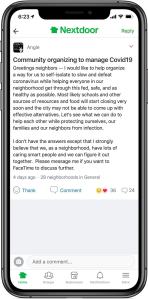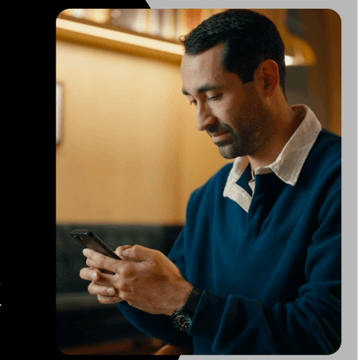Many communities know Nextdoor as an app and digital neighborhood message board where you can get a recommendation for a plumber, start a local parents group or find a cheap couch. But when crises occur, the neighborhood hub also provides members with up-to-the-minute hyperlocal updates from public agencies.
During events like 2017’s Hurricane Harvey and the 2018 California wildfires, Nextdoor saw a spike in engagement around affected areas.The current Covid-19 pandemic, however, marked the first time the San Francisco–based company would have to navigate a global issue.
“We’ve seen plenty of crises, but thus far, they were focused on a given country or region,” says Antonio Silveira, Nextdoor’s head of engineering. “We’ve never before dealt with something that hit the whole world at the same time.”
Nextdoor is in more than 260,000 neighborhoods across 11 countries. As the company transitioned its more than 400 employees to working remotely full-time, it made Slack its digital headquarters to keep day-to-day operations humming along.
[ad id="42750" /]A platform for crisis communication
Nextdoor is no stranger to communicating critical messages to the public. The company has built long-standing relationships with a wide range of public agencies, including fire departments, state health departments, utility companies and nonprofit organizations.
“Anytime a crisis occurs—and unfortunately, some of them happen out of nowhere—Nextdoor is where people go,” says Silveira. “Because we verify that all of our members are real people at real addresses, there really is no other platform where public agencies can reach residents at a neighborhood-specific level in real time.”
With the spread of Covid-19, organizations such as the Centers for Disease Control and Prevention in the U.S. and the Red Cross in Italy have turned to Nextdoor to share information about what to do and where to go for help. Nextdoor ensures that accurate information reaches people locally while also developing and releasing new tools to help neighbors support neighbors.
“We’re working around the clock to provide those services to partners so they can inform and provide services to neighborhoods across the world,” Silveira says.
Other public agencies using Nextdoor to communicate with members:
- State and regional health departments in the U.S.
- The U.K.’s National Health Service
- France’s Ministry of Health

“The stories I hear about neighbors helping neighbors using Nextdoor during this pandemic gives me hope that we care about each other despite our differences. In these moments of crisis, people can really come together.”
Scaling up to meet demand during Covid-19 with Slack
Because coronavirus responses have to be coordinated globally, Slack channels—a feature where team members can share messages, tools and files in a Slack workspace—help Nextdoor’s employees come together to capture a complete, uninterrupted, real-time picture of the crisis. This allows the company to make quicker, more effective decisions about how to leverage its platform to keep people informed and safe.
While transitioning to a fully remote workforce in response to Covid-19, Nextdoor added new Slack integrations such as Standup and Prosper to maintain daily check-ins for teams. The company also holds digital meetings in Google Hangouts and uses Slack Calls for quick one-to-one conversations.
Nextdoor spun up a number of Covid-19-specific channels, including:
#covid19-eng, where Nextdoor’s engineers are working to scale the platform to accommodate an influx of users#covid19-product, where the product team is developing new features specific to the emerging pandemic#nextdoor-praise, where stories about how communities come together on the platform are shared, from local businesses supporting the community to individual neighbors helping each other out. This channel has been a key resource for Nextdoor’s public relations and communications teams fielding media requests to find inspiring member stories
Slack has proved mission-critical for Nextdoor’s remote workforce as the platform continues to help partner agencies keep communities informed.
“The stories I hear about neighbors helping neighbors using Nextdoor during this pandemic gives me hope that we care about each other despite our differences,” says Silveira. “In these moments of crisis, people can really come together.” [# /]
















